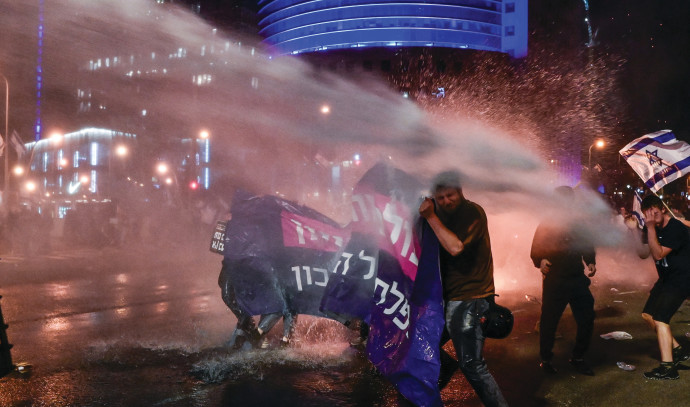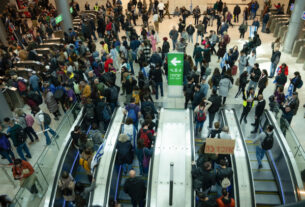Israel is a loud country. I’m not just talking about the people, who are boisterous in a beautiful and familiar manner, but in all regards, and that’s not always a positive.
We’re at a major crossroads right now, politically. With judicial reforms being a consistent source of stress in the public sphere, there is a constant sense of conflict with the person standing next to you. Protests have spread across the country, both for those who oppose the judicial reform and those who support it.
This, at a time in which our security tensions have increased as well, with rockets fired from the Gaza Strip, Lebanon and Syria, and numerous terror attacks leaving citizens wounded and even murdered.
And at every one of these events, there’s noise. Not just any noise – not just the voices – but sirens. Police sirens come to every protest, ambulance sirens are present at every terror attack, and rocket sirens are present at every renewed launch of attacks into Israel.
This status quo is present as we head toward Holocaust Remembrance Day, followed by Remembrance Day, the latter of which is spent mourning those who gave their lives in terror attacks and military operations, not unlike those in news headlines in the past couple of weeks. We mourn these lives with memorial sirens blaring in the background, bringing an entire country to complete silence, heads bowed.
This is, naturally, not a calm space to live in. Israelis tend to flinch at the sound of loud noises, thinking that they will have to run to a bomb shelter or that a terror attack has just occurred nearby.
Political panic
The political sphere is capable of causing so much increased distress. The Community Stress Prevention Center (CSPC) in Israel, for example, reported a 40% increase in applications to their treatment centers for distress in the past year alone. This unprecedented acute and trending increase in distress, in a very short time span, has led the center to open a hotline for those feeling anxiety and the like due to the political tensions in the country.
When it comes to the hotline, there were dozens of calls from both sides of the political spectrum, at more or less the same rate. People from all sides, according to the CSPC, feel distressed, threatened or even attacked because of the position they identify with politically or because someone at a protest thought them to be from the “other side.” The increase in calls, nevertheless, is across the board.
“The rise is an ongoing phenomenon that has now reached a new peak, with people who never called us for help, even during the long COVID-19 lockdowns, calling with fears, anxiety, depression, and most of all, helplessness and worries about when it will all end.”
Yiftach Benbenisti
“The rise is an ongoing phenomenon that has now reached a new peak, with people who never called us for help, even during the long COVID-19 lockdowns, calling with fears, anxiety, depression, and most of all, helplessness and worries about when it will all end,” CSPC director Yiftach Benbenisti told the Magazine.
He said that these fears, in many respects, “resemble clients suffering from domestic violence” who feel that “the conflict is inside, not outside.” That is to say, the turmoil is emotional.
The real surprise, he explained, is the number of newcomers to the center, who saw themselves previously as resilient and capable of managing their anxieties, who are now facing the reality of the political state of the country and finding themselves helpless.
According to Benbenisti, distress can be further exacerbated by spending many hours on social media, a general negative tendency in one’s thinking, and an inability to fall asleep.
This mass increase has led to organizations, such as the ICSPC, struggling to keep up with the demand of those seeking support and assistance.
Security stress
Various studies conducted in Israel and abroad have shown in the past few years that living with consistent exposure to terror attacks is harmful to the body and mind. In fact, according to a Hebrew University of Jerusalem study conducted in 2014, fear induced by consistent exposure to the threat of terrorism can lead to negative health consequences and increase the risk of mortality.
Post-traumatic stress disorder as well can be launched or triggered by increased tensions in the public sphere. During what was known as the “knife intifada,” a massive wave of terror attacks in 2015, some 8,000 Israelis developed PTSD as a response to the events happening around them every day.
Lest we forget, just two years ago, Itzik Chen, a former paratrooper in the IDF in Lebanon and Nablus, committed suicide after being recognized as a disabled veteran but was struggling to receive additional recognition for the mental illnesses that stemmed from his service.
The Defense Ministry denied that Chen’s suicide was related to the post-traumatic stress disorder he developed during his IDF service, but the IDF Disabled Veterans Association said at the time, “This is exactly the outcry that we have been raising the whole time. There are disabled IDF veterans who have been waiting for recognition for years, falling through the cracks over time and not receiving proper treatment.”
“This is exactly the outcry that we have been raising the whole time. There are disabled IDF veterans who have been waiting for recognition for years, falling through the cracks over time and not receiving proper treatment.”
IDF Disabled Veterans Association
Now, as Israel is launched into another round of security tensions, everyone is on edge. There is fear that the waves of mental health crises will make a comeback along with rocket and terror attacks. Yet these emotional crises, say professionals, have scarcely been addressed.
Tips for tension
Benbenisti offered several suggestions to deal with the anxiety and distress caused by the current tensions.
“Be mindful of yourself and your stress,” he said. This helps in “learning to manage” the pressure. Awareness is key.
According to Benbenisti, it’s crucial to “find ways to recharge, relax and focus on things that help you feel good.”
He explained that for those who want to go out and protest but are concerned about potential distress triggers, it is best to stick with people they know. “If you feel distressed, go to the side,” he added.
- Learn breathing techniques
Breathing techniques are methods to calm the breath as a method of getting the heart rate under control, thereby lowering feelings of stress and anxiety.
An example of this is the 4-7-8 method: Close your eyes and take a deep breath in through your nose for four seconds. Hold your breath for seven seconds, then slowly exhale through your mouth for eight seconds.
Spending an excessive amount of time on social media, as mentioned, can be quite harmful. Monitor how much time you are spending online, as well as watching television. These can further increase stress.
- Sleep, drink, eat, repeat
“Take care of your sleeping hours and make sure to drink liquids – not alcohol – and eat,” Benbenisti said.
We’ll be okay
A lot of different circumstances can lead to stress and, unfortunately, the nature of Israel doesn’t help prevent that. That being said, this is a wonderful country with resources galore.
And remember: Eventually, the sirens are quiet.




